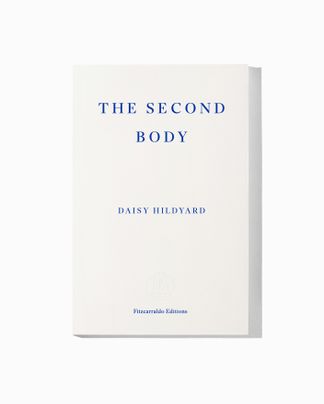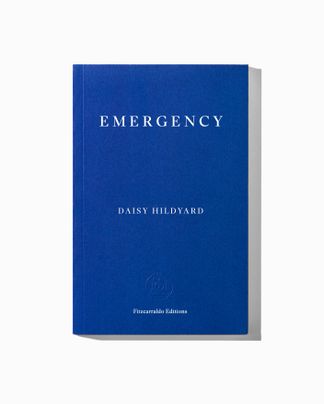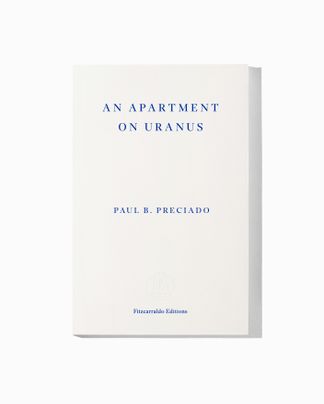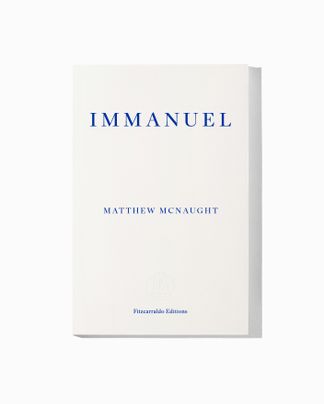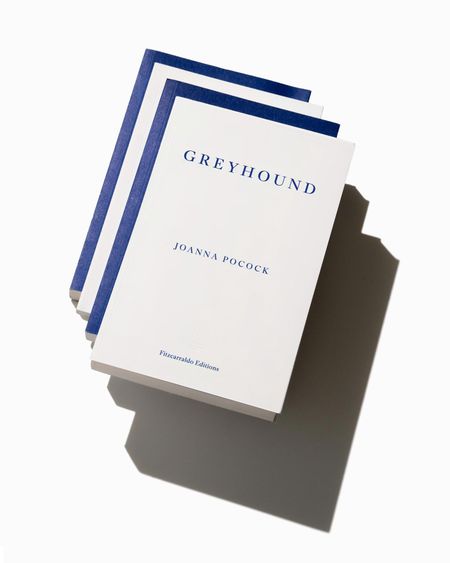Blending memoir with reportage, criticism with nature writing, Surrender is a narrative non-fiction work on the changing landscape of the American West, inspired by a two-year stay in Montana. At a time of personal crisis, after losing her parents and beginning menopause, Joanna Pocock becomes fascinated with radical environmental movements. She witnesses the annual tribal bison hunt near Yellowstone Park, where she meets a scavenger community honing ancestral skills. She joins Finisia Medrano, a transsexual rewilder, to learn about life on the Hoop. She attends the Ecosex Convergence, an annual gathering of people who place their relationship with the earth above everything else. With Surrender, the winner of the 2018 Fitzcarraldo Editions Essay Prize, Joanna Pocock offers a provocative and profound examination of life in an era of increasing climatic disruption.
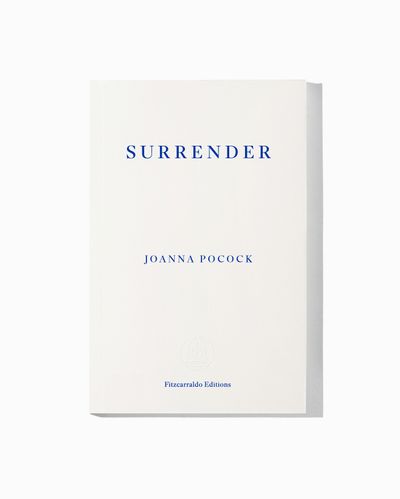
Surrender
French paperback with flaps, 320 pages
Published 15 May 2019
Surrender
We all hit the middle of our lives at some point. When my sister Mary turned twenty-six did she have any idea she would be dead at fifty-two? Not a clue. What we call our mid-life crisis often doesn’t hit at the mid-point of our lives unless we live into our eighties, nineties and beyond – which many of us won’t. A better term for ‘mid-life crisis’ is the less grandiose-sounding but perhaps more accurate ennui. By a certain age, we simply get bored of the rhythm of our days, whatever those may be: the commute to work on a packed train, the rush to get a child ready for school, the smell of car fumes as we sit in traffic, the dog whining for its walk. We tire of our living spaces and how the light hits a certain wall each afternoon. We sicken at the sight of the same smudge of sky from our beds, the piles of laughing gas canisters in the gutter, the seemingly endless whoosh of greasy Styrofoam fried chicken containers blowing down the pavement after the pubs close. And the pubs – even they seem threadbare and dull or loud and violent. We begin to realize that we have more past than future – the known is eclipsing the unknown. We panic and plan our escape, whether that be via psychedelic drugs, taking up a religion, or ditching the one we have, quitting our jobs, taking up a fresh partner, joining a polyamorous community – all in the belief we are heading towards that magical thing: freedom. Whatever form it takes, mid-life often arrives in a package with a bright red ‘self-destruct’ button attached.
The mid-life crisis package I was handed came in a box marked with one simple word: Montana. Over the years my husband Jason and I had spent time in New Mexico, Nevada, Texas, California, Colorado and Wyoming, either travelling or working on various writing and film projects. Now we were approaching fifty and it was time to leave our small patch of east London. The American West was calling us.
We developed an eccentric but effective process of elimination for finding exactly where in the West we might go. This was partly based on after-school activities for our daughter who was six when the planning began. Who knew that the only club she would be able to join in Alpine, Texas was cheerleading? Through a combination of coincidences and research we settled on the alliterative Missoula, Montana, and cajoled our daughter Eve into thinking this would be a Great Adventure. We packed up our house, filled one suitcase each and left London. I had the idea that we could pare away the superfluities of life, only allowing ourselves the necessities, or what Henry David Thoreau called the ‘necessaries’, the things that over time become ‘so important to human life that few, if any … attempt to do without’.
For Eve, this consisted largely of soft toys. The main player in her menagerie was a large rabbit called Lulu, with a strawberry-scented heart. Lulu’s accessories filled half a suitcase. I intervened at times over Eve’s choice of clothing. She had never experienced a North American winter, so I surreptitiously stuffed jumpers and warm socks among her swimming costumes and sundresses.
I found the process of deciding what I needed and what I thought I needed to be the first step in liberating myself from the known. I started with my books: Isabella Bird’s A Lady’s Life in the Rocky Mountains, Annie Dillard’s The Writing Life, Ralph Waldo Emerson’s Nature, The Cincinnati Arch: Learning from Nature in the City by John Tallmadge, The Significance of the Frontier in American History by Frederick Jackson Turner and the Moon Guidebook to Montana, which was a last minute gift from a friend.
Jason’s packing was quick: his camera, the novels he was reading and very few clothes. To Thoreau the ‘necessaries’ consisted of food and fuel. Clothing and shelter were only ‘half unnecessary’. Among the few implements he had with him at Walden Pond were a knife, an axe, a spade, a wheelbarrow, lamps, stationery and ‘access to a few books’.
We landed in Seattle and spent our first night at the Kings Inn, the last downtown motel in a rapidly gentrifying, or some would say, long gentrified city. We hired a car and drove east the next morning to begin our new life. My vision of Washington state as a lush ambassador of the Pacific Northwest with thick, impenetrable rainforests was challenged as we crested the Cascade Mountain Range. For hours our car windows transmitted a sandy blur of desert and sagebrush, which was replaced by deep green forests and rocky buttes as we hit the Idaho panhandle and then it thinned out again as we edged into western Montana.
It was on a sweltering July day that we took the exit ramp off Interstate 90 down into Missoula, a university town of around 65,000 people. The layout from above was puzzling. It looked as though a giant hand had tossed a bunch of buildings into the air, leaving them where they landed. Missoula now sat in the dried bed of an ancient glacial lake – its name means ‘place of the frozen water’ in the Salish language. I had imagined Missoula to be a pretty town with its ring of mountains and its snaking river, but as we approached, the reality was far from the idyll I had conjured.
My daughter read out ‘Five Guys Burgers and Fries’, savouring the rhyme, as we passed the fast food joint on a corner next to a towering Conoco petrol sign. After that, I don’t remember her saying a word. I think we were both stunned by the intense heat, the hard-edged sunshine, the long drive, by the giant signage, the wide roads, the landscape of objects and buildings at once familiar (trucks, shops, houses, roads) and yet utterly foreign in their details.
We pulled up in our rental car to the Campus Inn, which appeared to be the least run-down of the cheap motels on a strip of highway at the entrance to town. The faux quilted bedspreads gave off a vaguely simulated country aesthetic, quickly undermined by the strong smell of bedbug spray. Faded prints of Canada Geese flying across pastel wetlands hung above the Queensized beds.
That night I saw a type of funnel-web spider called a hobo. Its body was the size of a nickel and I watched, terrified, as it crawled along the skirting board. Jason and I kept quiet about the spider and lay in bed with Eve between us, listening to the trains chugging past the motel, their boxcars loaded with coal from eastern Montana. My scant dreams were apocalyptic and seemed to linger through the following day. Despite my better judgement, I gave into Eve’s pleas that we go swimming in the motel’s wildly overheated pool. A few days later, management mysteriously hung a ‘CLOSED’ sign on the door. E. coli had found its way into the water, which led to my kidneys becoming infected and a stay in an emergency ward. The hospital bill would take us months to pay off.
As we got into our rental car after that first sleepless night to find somewhere to have breakfast, the sun was coming down hard and hot and I remember thinking, ‘What the hell have we done?’ The Campus Inn would be our home until the house we had found to rent became free.
(…)
‘Pocock’s prose is understated and spare, and, like a cave painting, does perfect justice to her subject. It doesn’t debase the living world by trying to overword it. It is just a sketch, and in its gentleness touches it perfectly … This is nature writing that we need: standing in contrast to writing that forces the human into the picture as observer, or tries hard to pin the thing down exactly, with alienating expertise or florid description…. [Pocock’s] is a perspective not of objectivity or voyeurism, but of participation in the web of life and in the land and communities as she writes them.’
— Abi Andrews, Irish Times
‘This is a bewitching and deeply affecting book. Pocock’s elegant interweaving of the intimate and the expansive, the personal and the universal, culminates in a work that forces us to consider our own place in, and impact upon, a world that could itself have more past than future.’
— Tom Smalley, Spectator
‘Pocock is an environmentalist, yet she is also clearly a humanist. She is always willing to hear people out, no matter how extreme their points of view, and to accept the limits of her own knowledge…. Pocock’s writing is a prism, refracting hidden nuance from her subjects and meaning from memory…. whether it is climate crisis or midlife crisis, Pocock holds her themes lightly, allowing the “fluidity of life” to run its course.’
— Clare Saxby, Times Literary Supplement
‘What makes Pocock’s narrative voice so likeable is her frank outsider-ness when encountering some of the more extreme lifestyle choices – both on the political right with the wolf trappers, and on the liberal left with the ecosex earth lovers. She’s a city dweller in a monogamous relationship (and not with the earth), a vegetarian – but not a vegan or a paleo-dieter – and someone who can’t give up the cinema, bookshops or stable healthcare provision. Further, unlike some of the off-gridders that she encounters who harbour anger and resentment towards mainstream society, Pocock is enthusiastic about the potential for society to change. Her narrative voice becomes an earnest mediator between the extent, nuances and degrees of various modes of life-commitments to environmentalism and the average white middle-class, earth-conscious but ultimately safe liberal lifestyle.’
— Baya Simons, Review 31
‘Fascinating.’
— The Best Breakthrough Books of 2019, Mr Porter
‘Land and water, flesh and blood. The planet and the body. Society and the person. Surrender maps these profound fractal relationships with a precision and sensitivity that stunned me. Here is a singular spiritual travelogue of the American West that is worthy of D.H. Lawrence.’
— Walter Kirn, author of Up In The Air
‘Surrender is an astonishing book about the fragility of nature, grief, the American West, the consolations of travel and the exquisite agonies of mortal life. Pocock travels widely in time and space, through memories, visions, the deaths of her parents and the birth of her child. Beautiful, wise and deeply moving, this is ambulatory philosophy at its finest – for readers of Rebecca Solnit, Lauren Elkin, Garnette Cadogan and Iain Sinclair.’
— Joanna Kavenna, author of A Field Guide to Reality
‘Written with great narrative richness and an anthropologist’s intrepid gaze, Surrender is fascinating, urgent and profoundly compelling. It is an important addition to nature’s library.’
— Chloe Aridjis, author of Sea Monsters
‘In Surrender, Joanna Pocock follows rewilders, nomads, ecosexuals and a host of outliers who see living with and off the land as the salvation of our species and everything else on the planet. Her candid and beautifully written journey confronts the angst, guilt and grief she experiences while examining the greatest existential crisis of all time – the killing of diverse life on our planet. Pocock’s book is deeply researched and broad in its search for solutions. Her deft blending and layering of the personal with the political makes Surrender a necessary read for our times.’
— Edward Burtynsky
‘Joanna Pocock’s compelling debut, a tapestry of personal narrative and vibrant reporting, explores the fresh, unconventional, and often hopeful relationships with nature that are clashing with the tintype images of the American West. So much more than a memoir, Surrender is an important enquiry into the ground upon which we find and establish a home.’
— Harley Rustad, author of Big Lonely Doug
‘With apocalyptic imagery abounding, Pocock gives fascinating insight into people who are preparing for “serious social, economic or planetary disaster.”’
— Alice Furse, Minor Literatures
‘Pocock’s writing style is spare, allowing the landscape to speak for itself. She builds an urgent call-to-action through concrete details. She recalls the likes of Joan Didion, Annie Dillard, and Rebecca Solnit, and their own transcendentalist forebears like Emerson and Thoreau.’
— Emily Woodworth, Ecotheo Review
Joanna Pocock is an Irish-Canadian writer living in London. Her writing has notably appeared in the Los Angeles Times, the Nation and Guardian US, and she is a contributing editor at the Dark Mountain project. She won the 2018 Fitzcarraldo Editions Essay Prize for Surrender and in 2021 she was awarded the Arts Foundation’s Environmental Writing Fellowship. Greyhound is her second book.

